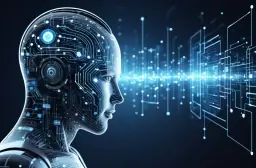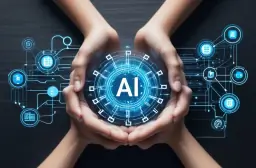AI in Government: Transforming Public Services Efficiently

Table of Contents
Artificial Intelligence (AI) is no longer confined to tech startups and private enterprises—it’s making significant strides in the public sector, transforming the way governments function. With its ability to analyze vast amounts of data, optimize processes, and predict future trends, AI offers unparalleled opportunities for government operations. As a result, AI is ushering in a new era of smarter, more efficient governance, where public services are streamlined, and decision-making processes are enhanced.
Have you ever wondered how AI can help governments provide better services to citizens? Or how intelligent systems could improve efficiency and transparency in public administration? We live in an age where the expectation of seamless services is growing, and governments are turning to AI to meet these demands. The use of AI in government isn’t just a trend; it’s a transformative force reshaping everything from policy-making to day-to-day administrative tasks.
In this article, we’ll explore how AI is revolutionizing public services, boosting efficiency, and enhancing the quality of governance. We’ll look at the various AI applications being adopted by governments worldwide, from machine learning-driven policies to automated services, and how these innovations are paving the way for a smarter, more responsive government.
The Role of AI in Government: Enhancing Public Services
AI is being leveraged in multiple ways across the public sector to enhance the efficiency of services and reduce costs. From automating repetitive tasks to predicting future needs, AI applications are improving everything from healthcare delivery to traffic management. Governments are using AI to deliver smarter public services that benefit both citizens and employees.
One major area where AI is making waves is in public sector automation. Tasks that once required significant human labor are now handled by AI systems. For example, routine administrative processes like document verification, processing applications, and answering inquiries are now often automated using AI technologies. By automating these tasks, governments are not only saving time and money but also reducing human error and increasing service delivery speed.
Furthermore, AI is assisting governments in policy-making by providing predictive analytics. Governments can use AI to analyze vast amounts of data, identify trends, and anticipate future needs. For example, in urban planning, AI tools can predict traffic congestion, helping local authorities make data-driven decisions to improve transportation infrastructure. This predictive power makes governance smarter, more anticipatory, and better equipped to deal with challenges before they arise.
Smart Governance: How AI is Shaping Modern Government Operations

One of the most exciting developments in the use of AI within government is smart governance. This involves the use of AI technologies to create a more transparent, efficient, and responsive government. Smart governance systems can process real-time data to help public officials make informed decisions quickly, improving the responsiveness of government services.
For example, AI is being used in smart cities, where data from sensors and IoT devices are processed by machine learning algorithms to optimize city management. These AI systems can predict and manage everything from traffic flow to energy usage, helping cities run more efficiently. By using AI to monitor and manage urban infrastructure, governments can reduce costs and improve the quality of life for citizens.
Moreover, AI is also enhancing government transparency and accountability. With the help of AI-powered analytics, governments can track the performance of various public services, identify inefficiencies, and take corrective actions faster. This level of oversight and accountability makes it easier to build trust with the public and ensure that government resources are being used effectively.
AI for Decision Making: Improving Government Choices
The integration of AI into government decision-making processes is having a profound impact. By using machine learning algorithms and predictive analytics, governments can make more informed, data-driven decisions. AI systems can analyze historical data, forecast future trends, and help policymakers design solutions that are more effective and efficient.
For example, AI is being used in public health policy to predict disease outbreaks, allocate resources, and design preventative measures. Similarly, AI is applied in criminal justice systems to assess risks and recommend sentencing, helping judges make decisions based on empirical data rather than subjective judgment.
Furthermore, natural language processing (NLP) is being used to analyze citizens’ feedback and petitions, allowing governments to quickly identify and respond to pressing concerns. This AI-driven decision-making process helps ensure that the government’s actions are based on evidence and the needs of the public, rather than guesswork or bias.
AI-Driven Public Services: Enhancing Citizen Experiences

AI is also improving the direct interaction between governments and citizens. With the rise of AI-powered chatbots and virtual assistants, citizens can now access government services 24/7. These AI tools can answer questions, guide individuals through bureaucratic processes, and even help with completing forms—making public services more accessible and user-friendly.
Another area where AI is making a significant impact is in social services. Governments are using AI to assess eligibility for welfare programs, optimize resource allocation, and improve the overall delivery of benefits. AI-driven systems can also help identify individuals who may need additional support, ensuring that services are targeted to those who need them the most.
Moreover, AI in education is improving access to learning resources, offering personalized educational tools, and supporting administrative functions. AI-powered learning platforms can adapt to individual student needs, providing a more tailored and effective educational experience.
Machine Learning and Cognitive Computing in Government
The potential of machine learning and cognitive computing in government is immense. These technologies allow AI systems to learn from data, adapt to new situations, and make decisions autonomously. Governments are increasingly adopting these technologies to automate processes, improve forecasting, and streamline administrative tasks.
For example, cognitive computing is being used in healthcare to enhance diagnostic accuracy. AI systems can analyze medical records, identify patterns, and recommend treatments, all while reducing human error. In public safety, machine learning is used to predict crime hotspots and optimize the allocation of law enforcement resources.
With these advancements, governments can create more efficient, self-improving systems that reduce the burden on public employees and improve overall service delivery. However, the integration of these technologies also raises important questions about data privacy, security, and the ethical implications of autonomous decision-making.
Challenges and Ethical Considerations of AI in Government
While the benefits of AI in government are clear, there are also significant challenges and ethical considerations that need to be addressed. Data privacy is a major concern, as governments handle vast amounts of sensitive information. Ensuring that AI systems are secure and protect citizens’ data is crucial to maintaining trust in government systems.
Another challenge is bias in AI algorithms. If not properly trained, AI systems can inadvertently perpetuate biases, leading to unfair outcomes in decision-making processes. Governments must ensure that AI systems are transparent, accountable, and free from discriminatory practices.
Finally, the impact on jobs is another important issue. As AI systems automate more tasks, there is a risk of job displacement in the public sector. Governments will need to consider how to reskill workers and manage the transition to an AI-driven workforce.
Frequently Asked Questions (FAQs)
What are the main benefits of AI in government?
AI offers numerous benefits to government operations, including increased efficiency, cost savings, and enhanced decision-making. It also improves transparency and helps governments provide better services to citizens.
How is AI used in public services?
AI is used to automate processes, improve decision-making, and enhance citizen interactions with government services. Applications include AI-powered chatbots, predictive analytics, and machine learning for resource allocation.
Are there any risks associated with AI in government?
Yes, there are risks, including concerns about data privacy, algorithmic bias, and job displacement. Governments must address these challenges to ensure the responsible use of AI technologies.
How can AI improve decision-making in government?
AI can improve decision-making by providing predictive analytics, analyzing large datasets, and supporting evidence-based policy design. It helps policymakers make more informed and effective choices.
What is the role of AI in smart cities?
In smart cities, AI helps optimize infrastructure management, traffic flow, energy usage, and public services. It ensures that city operations are more efficient, cost-effective, and sustainable.
Conclusion
The use of AI in government is transforming public services by making them more efficient, transparent, and responsive. From improving decision-making processes to enhancing citizen engagement, AI is reshaping the way governments operate. However, as with any technological advancement, there are challenges that need to be addressed, including privacy concerns and the ethical implications of AI-driven decisions.
By harnessing the power of AI, governments can provide smarter services that meet the growing demands of citizens while also improving operational efficiency. The future of governance is digital, and AI will play a critical role in ensuring that public services continue to evolve in a positive direction.
Key Takeaways
- AI is improving public sector efficiency and decision-making.
- Smart governance powered by AI optimizes city and infrastructure management.
- Predictive analytics and machine learning are transforming policy design.
- Ethical challenges such as bias and privacy concerns must be addressed.
- AI is essential for creating responsive, transparent, and cost-effective government operations.
Popular Tags
ADS SPACE HERE


